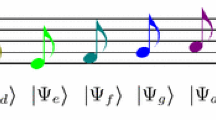Abstract
With the richness of material and cultural life, participating in music activities and enjoying music works has become an indispensable activity in people’s leisure time. The rich emotions in music have different performances according to individual differences. After the composers create the music, the performer’s deductive processing and then the emotion is sublimated by the viewers finally. This paper proposes a new emotional system for basic emotional joy, anger, sadness, joy, etc., and interprets the superposition state of emotional expression in detail. The paper believes that the generation of consciousness and the resonance of thinking are precisely the result of the quantum collapse of mutual entanglement.
Access this chapter
Tax calculation will be finalised at checkout
Purchases are for personal use only
Similar content being viewed by others
References
Wang, X., Yang, C.: On the emotional factors in music performance art. Musical Concept (12) (2011)
Zhang, M.: On the emotional expression in the art of vocal performance. Brand (Lower Half) (3) (2015)
Feng, B.: Analysis of the expression art of emotion in music. Popular Lit. (2), 134 (2013)
Ding, G., Jin, Q., Mei, P., Zhang, F.: The opportunities and challenges of quantum computing. Biomed. J. Sci. Tech. Res. 6(3), 1–3 (2018)
Kokosar, J.: Arguments and model for quantum consciousness, modification of quantum collapse, and panpsychism (2013)
Sbitnev, V.I.: Quantum consciousness in warm, wet and noisy brain. Mod. Phys. Lett. B 30(28), 1650329 (2016)
Myroniv, B., Wu, C.-W., Ren, Y., Christian, A.B., Bajo, E., Tseng, Y.-C.: Analyzing user emotions via physiology signals. Data Sci. Pattern Recogn. 1(2), 11–25 (2017)
Zuo, C.: Penrose’s exploration of quantum mechanics of consciousness and its spiritual philosophical significance. Central China Normal University (2015)
Xiaofeng, W., Guohua, Y., Peng, L., et al.: A neural network music sentiment classifier construction algorithm based on relevance feedback. J. Northwest. Univ. (Nat. Sci.) 42(1), 30–35 (2012)
Sloboda, J.A.: Music structure and emotional response: Some empirical findings. Psychol. Music 19(2), 110–120 (1991)
Wiese, M.A., Holland, E.D., Barbee, E.R.: Musical system: US, US 8008560 B2 (2011)
Xie, X.: Research on the audience of dance creation to the market. China Academy of Art (2015)
Bella, S.D., Peretz, I., Rousseau, L., et al.: Development of the happy-sad distinction in music appreciation. Ann. NY Acad. Sci. 930(1), 436–438 (2010)
Livingstone, S., Muhlberger, R., Brown, A., et al.: Changing musical emotion: a computational rule system for modifying score and performance. Comput. Music J. 34(1), 41–64 (2010)
Conte, E.: Testing quantum consciousness. Neuroquantology 6(2), 126–139 (2008)
Goradia, S.: Quantum consciousness the road to reality (6), 269–272 (2016)
Stenger, V.J.: The myth of quantum consciousness. Humanist 53, 13–15 (1992)
Zheng, R.S.: Quantum consciousness - a new understanding originating from quantum psychology. J. Xuzhou Normal Univ. (2008)
Husain, S.: Universal field of quantum consciousness: an ontological nexus of classical and quantum physics. Neuroquantology 8(3), 279–286 (2010)
Acknowledgements
This study was supported by the Major Project of Sichuan Province Key Laboratory of Digital Media Art under Grants No. 17DMAKL01 and supported by Fujian Province Guiding Project under Grants No. 2018H0028 and supported by National Nature Science Foundation of China (Grant number: 61871204).
Author information
Authors and Affiliations
Corresponding author
Editor information
Editors and Affiliations
Rights and permissions
Copyright information
© 2019 Springer Nature Switzerland AG
About this paper
Cite this paper
Peng, M., Gangyi, D., Qiankun, J., Fuquan, Z. (2019). Using Quantum Thinking to Construct a Musical Appreciation System. In: Zhao, Y., Wu, TY., Chang, TH., Pan, JS., Jain, L. (eds) Advances in Smart Vehicular Technology, Transportation, Communication and Applications. VTCA 2018. Smart Innovation, Systems and Technologies, vol 128. Springer, Cham. https://doi.org/10.1007/978-3-030-04585-2_24
Download citation
DOI: https://doi.org/10.1007/978-3-030-04585-2_24
Published:
Publisher Name: Springer, Cham
Print ISBN: 978-3-030-04584-5
Online ISBN: 978-3-030-04585-2
eBook Packages: Intelligent Technologies and RoboticsIntelligent Technologies and Robotics (R0)




